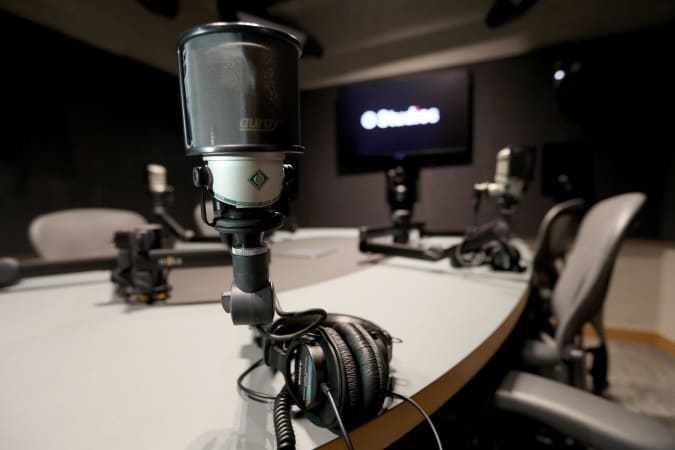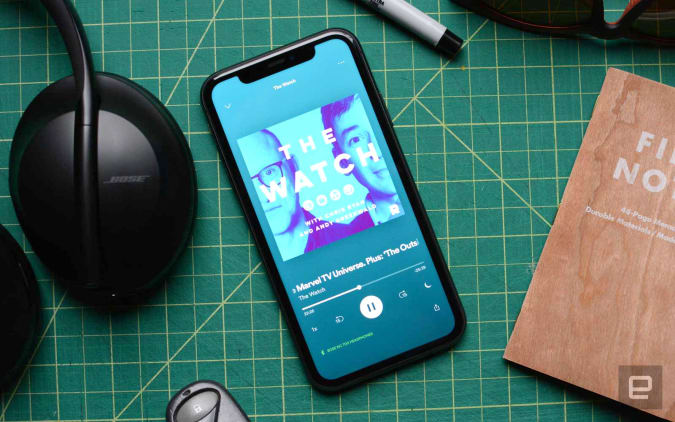From musicians pulling their music to a high-profile podcaster pausing their exclusive show, Spotify is under attack from all sides. Furore over Joe Rogan’s podcast and Spotify’s subsequent misinformation policies and actions has come both internally and externally. Much of the backlash is warranted as Spotify hasn’t been up front about the content of Rogan’s podcast, or misinformation in general. And the lack of transparency is why the company’s current issues are much bigger than one massively popular creator.
By now, you’ve likely heard something about the Joe Rogan saga. The popular podcast host has been controversial for years, but criticism ramped up after a December 31 episode featuring physician and biochemist Dr. Robert Malone. While speaking to Rogan, Dr. Malone made a number of unfounded claims about COVID-19 vaccines, including that “mass formation psychosis” led many in the US to take the jab. After the episode was posted, hundreds of doctors, nurses, scientists and educators sent a letter to Spotify urging it to create a clear misinformation policy and take “responsibility to mitigate the spread” of such content.
When the group posted the letter online, Engadget reached out to Spotify to ask if the company already had a misinformation policy, how it takes action against misinformation and if it was considering any action against the Malone episode of JRE. The company didn’t respond. Two weeks later, CEO Daniel Ek penned a statement on the matter and posted the company’s “platform rules” on a Sunday afternoon. It’s unclear if Ek was already planning to publish the platform-wide policy or if it was in response to a report two days earlier of internal explanations to employees as to why certain episodes of Rogan’s podcast hadn’t been removed.
During the company’s Q4 2021 earnings call last week, Ek took responsibility for not publishing the content policy sooner. “We should’ve done it earlier and that’s on me,” he admitted. To employees during a company meeting the same day, the CEO explained that Spotify is not a publisher, so it doesn’t have creative control over Rogan’s show in advance. He said that since JRE is licensed content, it doesn’t have oversight like it does for podcasts from The Ringer or Gimlet – production companies Spotify owns. “We don’t approve his guests in advance, and just like any other creator, we get his content when he publishes, and then we review it, and if it violates our policies, we take the appropriate enforcement actions,” Ek said.
A control room at Spotify’s “Pod City.”
Genaro Molina via Getty Images
Washington Post columnist Margaret Sullivan wrote this weekend that Spotify’s “failure to take any meaningful responsibility, other than adding a few disclaimers, is all too reminiscent of the way Facebook, for years, has dodged accountability for spreading so many harmful lies.” And part of shirking responsibility comes in the form of Spotify’s argument of a platform versus a publisher.
Spotify is a publisher, no matter what it says to the contrary. Paying a reported $100 million to lock down JRE as an exclusive brings more responsibility for its content than a show from “any other creator.” Ek argued during that same speech to employees that “exclusivity does not equal endorsement” and that the solution is to secure “an even broader set of exclusives that represent even more voices.” These two statements point to Spotify trying to build a foundation when the house is nearly finished.
A treasure trove of exclusives has helped make Spotify the number one podcast app in the US, according to Ek. Over the last few years, the company has purchased podcast production studios like Gimlet, Parcast other The Ringer, making shows exclusive to its service along the way. It has amassed a wealth of talent, including the most popular podcast globally on Spotify in Joe Rogan’s show. Sure sounds like the behavior of a publisher.
One of Spotify’s most important podcast acquisitions what anchor, to an all-in-one production suite that made creating and publishing shows a breeze. The company has since leveraged its powerful ad setup for shows on the service and Anchor has regularly introduced new features to make recording even easier. It’s literally a place where anyone can publish a podcast and it has helped Spotify add over a million shows to its library. In late 2020, Spotify said Anchor accounted for 70 percent of its podcasts, around 1.3 million at the time.
Billy Steele/Engadget
However, Anchor’s own platform policy hasn’t been updated since July 2021. There’s no mention of COVID-19 misinformation, except for one item that bans any content that “conflicts with the Terms, as determined by Spotify, collectively (‘Objectionable Content’).” Right now, that would include Spotify’s recently published policy. However, until recently, those guidelines weren’t public, and Anchor wasn’t clearly displaying Spotify’s policy. Now it’s doing like that via a clickable pop-up when you upload a show.
“Spotify’s Platform Rules apply to all content on Spotify, including Anchor,” a Spotify spokesperson told Engadget. “We began highlighting our Platform Rules in our creator and publisher tools on February 2nd to raise awareness around what’s acceptable and help creators understand their accountability for the content they post on our platform.”
The lack of transparent guidelines is Spotify’s biggest problem. The issue goes beyond Joe Rogan and covers the entire platform. When asked for comment about removing Neil Young’s music from the service (at his request), the company said it had “detailed content policies in place and we’ve removed over 20,000 podcast episodes related to COVID-19 since the start of the pandemic.” Those policies were not made public until four days later. What’s more, when Engadget asked for information about the “over 20,000” podcasts that had been pulled, Spotify didn’t respond.
Right now, we only know about a few specific instances of content actions. So what happens when a creator who’s not being paid a vault of money espouses similar opinions to the ones Joe Rogan or his guests share on JRE? You know, the ones the company has already said “didn’t meet the threshold for removal.” On last week’s earnings call, Ek was adamant that Spotify doesn’t “change our policies based on one creator nor do we change it based on any media cycle, or calls from anyone else.” However, a Media Matters analysis of Rogan’s show going back to July 2020 highlights numerous times the podcast host has run afoul of the “long-standing” rules on violence or hatred toward marginalized communities and COVID-19 misinformation.
Spotify is saying more about the situation to employees than it is to the public, and none of it is sensitive info or trade secrets. By addressing a major controversy in private, which is ultimately reported by the media, the company further erodes what trust it has left. The company hasn’t publicly confirmed that it removed over 70 pre-Spotify-deal episodes of Joe Rogan’s podcast for racist language, including use of the n-word, late last week at Rogan’s request. But, again, Ek acknowledged the move to employees internally. Why not just let an unnamed spokesperson confirm the details when asked? Especially given Rogan himself addressed the content of those episodes in an apology video. The company also needs to open up about podcast removals and disclose what its review procedure is.

Genaro Molina via Getty Images
Spotify created a content policy, so it’s clearly considering how to police its platform. But what’s in place now is only a partial solution in need of immediate expansion, explanation and revision before more damage is done. It’s vague at a time where some specifics would go a long way. This is not about advocating for the company to “silence” Joe Rogan over his COVID views or anyone else who has been wrong on a podcast. It’s clear the company isn’t going to do so under the terms of its current deal with the host anyway. But a blanket warning label and mostly rationalizing its actions in private isn’t enough.
Of course, Spotify isn’t the first big tech company to hide behind the “platform” label, especially when it comes to taking responsibility for content. Facebook is perhaps the biggest example, as it has argued it’s a technology platform rather than a publisher. CEO Mark Zuckerberg has said the company does bear some responsibility for what’s on the site but its actions have been carpet at best. Facebook has also argued that it’s a publisher when taking such a stance is beneficial in court. Twitter has made the same case, most notably when questioned on how it enforces a “hacked materials” policy regarding a story about Hunter Biden’s laptop. “Is Twitter a publisher? No, we are not. We distribute information,” then CEO Jack Dorsey told Congress. Section 230, the law that currently protects platforms from legal action for things users post, enables companies to make the argument. And that’s a big reason why Congress is looking to reform it.
Ek wrote in his most recent message to staff that “canceling voices is a slippery slope,” and that’s true. The issue is the chief executive’s mission to find “a balance,” whether that’s with a wider variety of viewpoints or by equally weighting “creator expression with user safety.” Unless that balance comes with more transparency and oversight, more volume isn’t going to solve anything.
All products recommended by Engadget are selected by our editorial team, independent of our parent company. Some of our stories include affiliate links. If you buy something through one of these links, we may earn an affiliate commission.

